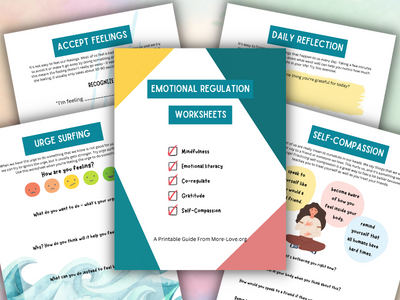
by Dr. Ashley Southard
We interviewed Dr. Ashley Southard of A New Beginning, and she gave us some excellent information about how outpatient treatment works for eating disorders.
Below are her comments:
Outpatient Treatment for Eating Disorders
Outpatient treatment for an eating disorder is a great option for children, adolescents, and adults who are medically stable and able to maintain their day-to-day responsibilities outside of treatment.
Outpatient treatment typically includes 1-3 hourly sessions per week with various members of the treatment team, which may include a therapist(s), registered dietitian, pediatrician/physician, and/or psychiatrist.
Minors participating in treatment have access to many therapeutic services, including but not limited to individual therapy, family therapy, and group therapy; each of these modalities serve important roles in a child’s full recovery from an eating disorder.
Emotional Regulation Worksheets
Give these printable worksheets to grow more confident, calm and resilient and feel better, fast!
- Self-Esteem
- Self-Regulation
- Mindfulness
- Calming strategies
Outpatient care is a wonderful treatment option for many families affected by eating disorders because it provides stability in the midst of a very difficult situation. It often allows the child to continue developing academically, socially and emotionally while addressing the eating disorder.
Outpatient treatment affords the entire family system an opportunity to work together to achieve recovery, and is less likely to leave the child feeling like the identified patient (IP) who is responsible for making all of the changes.
Parental Involvement
Based on attachment theory, parents are the most powerful agents of change in their child’s life, so long as they are modeling healthy thoughts and behaviors that support eating disorder recovery. Thus, family therapy is often recommended, affording the child and parents (and siblings, when appropriate) the opportunity to learn what is involved in achieving full recovery, develop healthy communication with each other, and resolve any old hurts/wounds that may be contributing to the maintenance of the eating disorder.
Parents’ level of participation in therapy will depend on a variety of factors, including the child’s age, severity of eating disorder, and providers’ recommendations. For example, when a child or adolescent has a severe eating disorder such as severe anorexia, parents may be encouraged to take a very active role in managing all food activity for the child. This approach is often referred to as family-based treatment, FBT, or Maudsley.
For all types of eating disorders, parents and family members are encouraged to adopt a healthy relationship with food, such that they are eating with balance, variety, and moderation.We have a Registered Dietitian who works very closely with parents to help them learn which foods to offer at home, which portions are appropriate, and how to create a healthy family culture around food.
Impacts on Family Life
The impact of outpatient treatment on a family’s life will vary, depending on the severity of the eating disorder and the frequency of treatment required. Especially when a severe case of anorexia demands family-based treatment, FBT, or Maudsley, food and therapy become the main focal point for everyone in the family, which can be emotionally draining for all involved. However, as the family successfully moves through treatment and the child assumes more responsibility for his/her recovery, families are able to take a less active role in the day-to-day management of the child’s eating.
For children and adolescents with less severe eating disorders, such as milder forms of Anorexia Nervosa, and bulimia, orthorexia and binge eating disorder, family life may be slightly less impacted by the treatment process. While parents may not need to monitor all food activity, they are still responsible for supplying recommended foods and ensuring that their child attends all recommended treatment services. Additionally, families may be invited to attend regular family therapy sessions on a weekly or bi-weekly basis, or they may be periodically invited as adjuncts to their child’s individual therapy.
Regardless of level of involvement, it is imperative that the home environment in which the child or adolescent lives is compatible with the work they are doing to achieve and maintain full recovery from their eating disorder.
Additionally, families are encouraged to model healthy body image by embracing their own bodies with respect and refraining from commenting about others’ bodies.
What Parents Should Know About Eating Disorder Treatment
Our psychotherapists often work with the family to explore what the child/adolescent is trying to communicate vis-a-vis food and body. We often find that poor family communication, trauma, and unresolved pain from the past is driving the eating behavior, and so we work hard to heal these emotional roots in the family system, not from a critical standpoint, but from a healing standpoint for the sake of the child’s recovery.
Dr. Ashley Southard is a therapist in Scottsdale, AZ specializing in the treatment of eating disorders, trauma/abuse, and relationship issues. You can follow her on Twitter at @drashleys, and Facebook at /anewbeginningaz and /thehealthyweighout. You can find her online at www.ANewBeginning.com and www.TheHealthyWeighOut.com.



